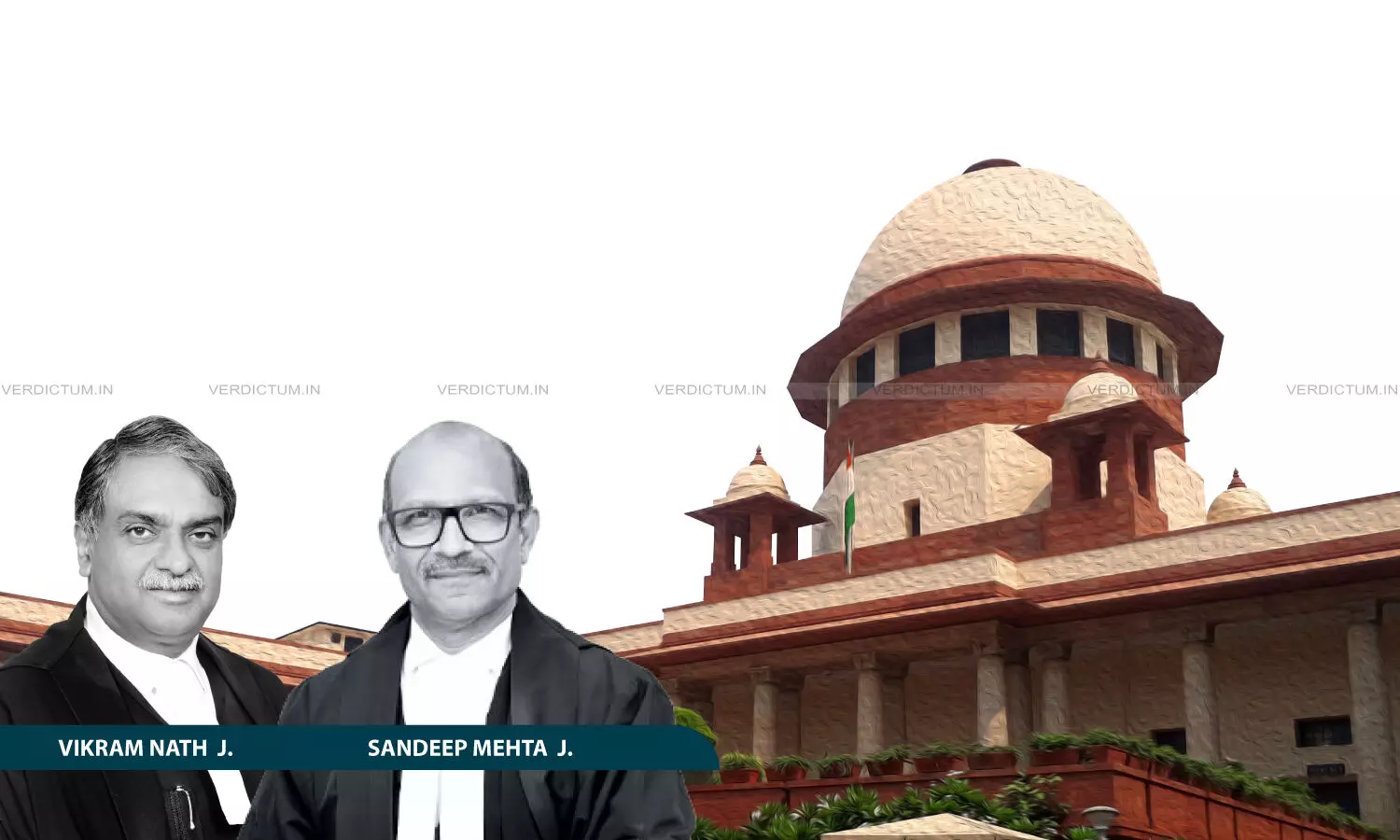
Justice Vikram Nath, Justice Sandeep Mehta, Supreme Court
Order XXX Rule 10 CPC Does Not Debar Suit Being Filed Against Proprietor: Supreme Court
 |
|The Appeal before the Supreme Court was filed challenging the judgment of the Andhra Pradesh High Court whereby the respondent’s application under Order VII Rule 11 of CPC was allowed.
While upholding an order allowing an application under Order VII Rule 11 CPC, the Supreme Court has explained that once the proprietor has been impleaded as a party representing the proprietorship, no prejudice is caused rather the interest is well protected and taken care of by the only and only person, who owns the proprietorship.
The Court also held that Order XXX Rule 10 CPC does not in any manner debar a suit being filed against the proprietor.
The Appeal before the Apex Court was filed challenging the judgment of the Andhra Pradesh High Court whereby the respondent’s application under Order VII Rule 11, Code of Civil Procedure, 1908 was allowed, and the plaint of Original Suit was rejected.
The Division Bench of Justice Vikram Nath and Justice Sandeep Mehta held, “The use of the word can in Order XXX Rule 10 CPC only indicates that proprietorship concern may be made a party. However, it does not necessarily mean that the proprietor itself if made a party would not be enough, inasmuch as, the proprietorship is to be defended by the proprietor only and not by anybody else. Once the proprietor has been impleaded as a party representing the proprietorship, no prejudice is caused to rather its interest is well protected and taken care of by the only and only person, who owns the proprietorship. Order XXX Rule 10 CPC does not in any manner debar a suit being filed against the proprietor.”
Senior Advocate K. Parameshwar represented the Appellant, while AOR C. K. Sucharita represented the Respondent.
Factual Background
The suit schedule property is in the ownership of the appellants. One Aditya Motors (lessee), a sole proprietorship concern of Pilla Durga Prasad (P.D. Prasad) requested the appellant to lease out the same. Accordingly, under a registered lease deed, the scheduled premises were leased out to Aditya Motors. After the expiry of the lease period, the lessee did not vacate the premises. Without the consent of the owner-appellant, Aditya Motors inducted M/s. Associated Auto Services Pvt. Ltd. The appellant, after due notice under Section 106 of the Transfer of Property Act, filed a suit for eviction of not only the lessee but also M/s. Associated Auto Services Pvt. Ltd. and its two directors. The lessee, M/s. Associated Auto Services Pvt. Ltd. and the two directors were impleaded as defendants.
An application seeking an amendment to the plaint under Order VI, Rule 17 of the CPC, filed by the appellant, was allowed. The defendant moved an application under Order VII Rule 11 CPC to reject the plaint on the ground that since the plaint had been amended and Aditya Motors had been deleted and in its place Pilla Durga Prasad had been substituted, the plaint did not disclose any cause of action against Prasad, and as such it was liable to be rejected. The Trial Court rejected this application. The Revision filed by P.D. Prasad was allowed by the High Court, saying that the proprietorship concern ought to have been made a party as it could be sued, but it could not sue on its own. Aggrieved by the same, the appellants approached the Apex Court.
Reasoning
The Bench, at the outset, explained that a proprietorship concern is nothing but a trade name given by an individual for carrying on his business. A proprietorship concern is not a juristic person. It cannot sue, however, in view of Order XXX Rule 10 CPC, it can be sued. The Bench also observed, “It is well settled by series of judgments that proprietorship concern cannot be equated either with a company or with a partnership firm. Order XXX deals with partnership basically, however, Rule 10 thereof refers to proprietorship. It makes very clear that proprietorship concern cannot sue but it can be sued. Whether proprietorship concern is sued in its name or through its proprietor representing the concerned is one of the same thing.”
As per the Bench, the High Court had taken a completely hyper technical view not realising that there was no prejudice caused and the cause of action very much accrued against the proprietor as he alone had signed the lease deed on behalf of the proprietorship concern and there was no involvement of any second or third party, whose interest could be said to have been prejudicially affected. Once the interest of the proprietorship concern was taken care of by the proprietor having been impleaded nothing further remained.
Reference was made to the judgment in Transport Agency v. Awadhesh Kumar and another (1998) wherein the Court explained that a proprietary concern is only a business name and Order XXX Rule 10 is merely enabling, the real party being the proprietor.
Thus, allowing the appeal and setting aside the impugned order, the Bench asked the Trial Court to proceed in accordance with law to decide the suit on its own merits.
Cause Title: Dogiparthi Venkata Satish v. Pilla Durga Prasad (Neutral Citation: 2025 INSC 1046)
Appearance
Appellant: Senior Advocate K. Parameshwar, Advocates Rao Vishwaja, P. Vamshi Rao, Shreenivas Patil, AOR Tatini Basu, AOR
Respondent: AOR C. K. Sucharita, Advocate Vinod Kumar Gupta, AOR Praseena Elizabeth Joseph, Advocates Shivang Goel, Juhi Bhargava, AOR Jaikriti S. Jadeja